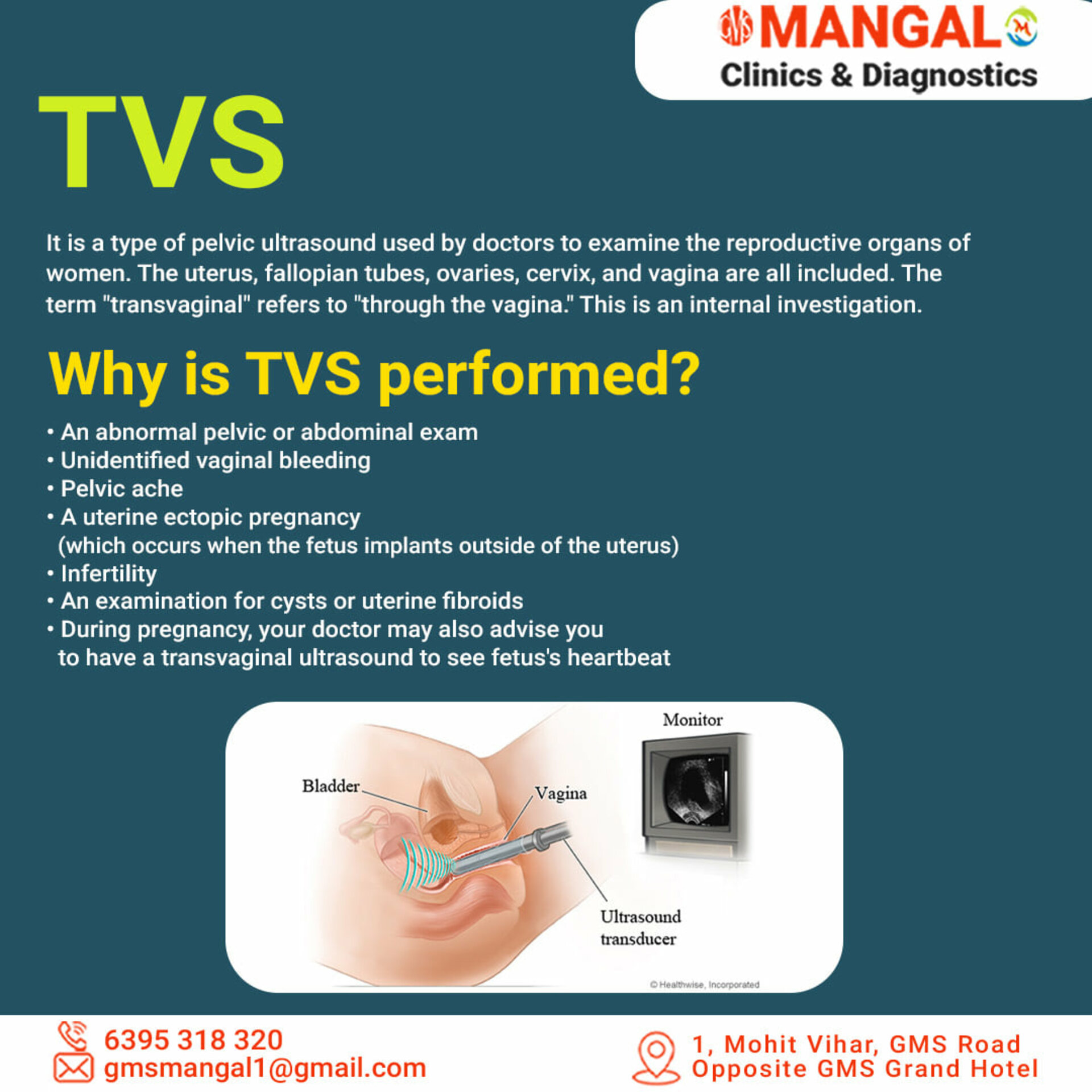Transvaginal Ultrasound (TVS) is a specialized diagnostic tool that plays a crucial role in women's health. This advanced imaging technique provides detailed insights into the reproductive organs, helping in the early detection and management of various gynecological and obstetric conditions.
As a trusted radiologist in Dehradun, Dr. Deepti Agarwal emphasizes the importance of understanding TVS, its uses, and the conditions it can help diagnose.
What is TVS?
TVS, or Transvaginal Ultrasound, is a type of pelvic ultrasound that involves an internal examination through the vagina. The term "transvaginal" literally means "through the vagina." This procedure uses high-frequency sound waves to create detailed images of a woman’s reproductive organs, including:
- Uterus
- Fallopian tubes
- Ovaries
- Cervix
- Vagina
Unlike abdominal ultrasounds, TVS offers a closer and clearer view of the pelvic organs, making it particularly effective for diagnosing issues that may not be visible with external imaging.
Why is TVS Performed?
TVS is recommended for a variety of medical reasons, including the evaluation of symptoms, monitoring of ongoing conditions, and prenatal assessments. Below are some of the most common indications:
1. Abnormal Pelvic or Abdominal Exam
If a routine pelvic or abdominal examination reveals irregularities, a TVS can provide a more detailed view of the area to identify the cause.
2. Unexplained Vaginal Bleeding
TVS is often used to investigate the source of abnormal vaginal bleeding, helping to identify potential issues such as uterine fibroids, polyps, or hormonal imbalances.
3. Pelvic Pain
For women experiencing persistent pelvic pain, TVS can help diagnose conditions like ovarian cysts, pelvic inflammatory disease, or endometriosis.
4. Ectopic Pregnancy
TVS is crucial in detecting ectopic pregnancies, a serious condition where the fertilized egg implants outside the uterus, often in a fallopian tube. Early detection is essential to prevent complications.
5. Infertility
In cases of infertility, TVS is used to assess the health of the reproductive organs, identify potential blockages in the fallopian tubes, or detect conditions like polycystic ovary syndrome (PCOS).
6. Examination for Cysts or Uterine Fibroids
TVS helps in identifying and monitoring ovarian cysts, uterine fibroids, and other abnormalities that can affect a woman’s reproductive health.
7. Monitoring During Pregnancy
During pregnancy, TVS may be performed in the early stages to:
- Confirm the pregnancy.
- Check the fetal heartbeat.
- Monitor the health of the uterus and cervix.
How is TVS Performed?
TVS is a straightforward and minimally invasive procedure. Here’s what to expect during the examination:
- Preparation: The procedure usually requires an empty bladder, so you may be asked to urinate before the test.
- Procedure: A slender, lubricated ultrasound probe (called a transducer) is gently inserted into the vagina. The transducer emits sound waves that bounce off the internal structures, creating detailed images on a monitor.
- Duration: The entire procedure typically takes 15-30 minutes and is performed in a comfortable and private setting.
- Aftercare: Most women can resume their normal activities immediately after the exam.
Is TVS Safe?
TVS is a safe and painless diagnostic tool with no known risks. It does not involve radiation, making it suitable for use during pregnancy and for repeated evaluations. Some women may experience mild discomfort during the procedure, but it is generally well-tolerated.
Benefits of TVS
TVS offers several advantages over traditional imaging techniques:
- Enhanced Clarity: Provides high-resolution images of the reproductive organs.
- Early Detection: Enables the diagnosis of conditions in their early stages, improving treatment outcomes.
- Non-Invasive Monitoring: Allows for the ongoing assessment of reproductive health without surgical intervention.
- Prenatal Care: Plays a critical role in ensuring the health of both the mother and baby during pregnancy.
Transvaginal Ultrasound is a powerful tool for diagnosing and managing a wide range of gynecological and obstetric conditions. Whether you’re dealing with unexplained symptoms or seeking routine prenatal care, TVS provides valuable insights into your reproductive health.
